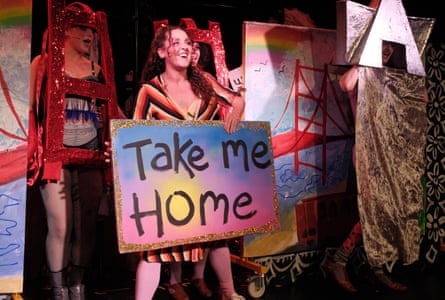This riotous ensemble captures the countercultural spirit of the 1970s and the heart of the San Francisco drag outfit the Cockettes from the off. Playing the psychedelic theatre troupe made up of hippies and drag queens, these eight performers are magnetic, conjuring up a cabaret wildness between them.
They sing, dance and sashay out from beyond a red curtain in outre outfits. Allen and Adcock’s costumes are stone cold fabulous: a storm of fishnets, feathers, kooky dresses, long socks and bodices. There are Sgt Pepper jackets twinned with ballerina tutus and a dazzle of sequins. The choreography by Paul McGill is cheeky, quirky, cute. It is all so imaginative, and winning.
The one – significant – setback is that there is just not enough to Rae Binstock’s skimpy book. The Cockettes get together, make it big in San Francisco and are booked for New York, but their opening night is a flop, so they go back home.
You get a sense of what this LSD-taking troupe stands for and that they become their own chosen family. But there is no filling in of the details so you do not learn much about their avant-gardism, and that they endeavoured to put their lifestyle on stage.
There is a central tension between Hibiscus (Andrew Horton, whose song, A Crab on Uranus, is a highlight) and Sylvester (Gregory Haney, just as good with his song, There’s a Lady on the Stage). The former refuses to go to New York but this fallout is not carried through. Hibiscus merely makes a return by the end of the play when all is well again.
The bigger political anxieties of the time waver in the background via “read all about it” news-stand summaries, from the Vietnam war to the assassination of Martin Luther King, race riots and National Guard violence against protesting students. It’s broad-brush and, at times, the sense of anarchy on stage trips over into confusion. Under the direction of McGill, it is not always immediately clear what is going on. This is not helped by a sound system that seems to over-amplify voices so that lyrics are occasionally hard to discern. The singing is still sparky, with Baylie Carson, who plays Sweet Pam, especially characterful.
We hang on for Brandon James Gwinn’s songs as well as the dance and glitter of the performances. And despite the dearth of story, there is such zest and infectious joy to the show that it enlivens you, mayhem and all.









